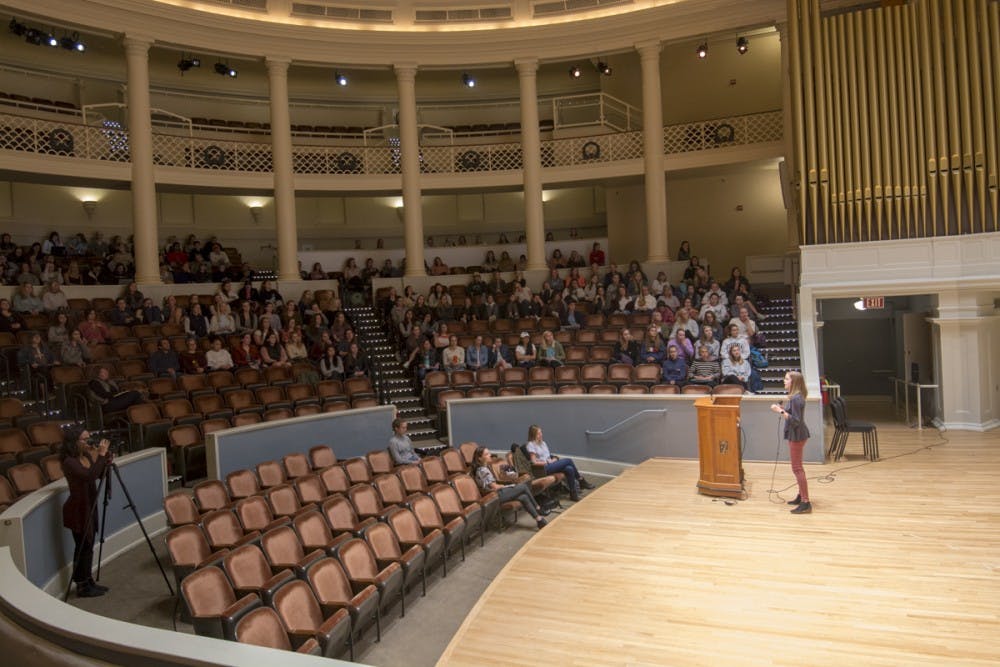In an event at Old Cabell Hall Sunday afternoon, students and community members discussed the history and repercussions of sexual assault at the University. Entitled “Rolling Stone Wasn’t the Beginning: A History of Sexual Violence at UVA,” the event was the capstone presentation concluding this year’s “Wellness Week” — a week of dialogue at the University centered around student wellbeing and health, including discussion around sexual assault awareness.
The presentation was hosted by the Inter-Sorority Council in partnership with the University Guides Service and was co-sponsored by the Inter-Fraternity Council as well as the Office for Equal Opportunity and Rights.
Following a brief introduction by Zoe Denenberg, a fourth-year College student and ISC president, Mary Boyd Crosier, a fourth-year Engineering student and chair of the University Guide Service, narrated a brief history of sexual assault at the University. Crosier’s account opened in the early years of the University.
She described early University students as largely the sons of white, wealthy and southern plantation owners who exploited enslaved African-American laborers.
“To begin that conversation, we have to go back to the school’s very founding and to the 1800s,” Crosier said. “A lot of tensions arose between students and enslaved laborers who lived and worked here at that time, and it is in this that we see some of the first examples of sexual assault at U.Va.”
Following an outbreak of illness in 1826, Crosier said University student George Hoffman “insulted and stripped a servant girl of her clothes” and added that “that this was done under the impression that she was one of the women who had infected students.” Crosier said Hoffman faced minimal repercussions for his actions, and his parents were notified of the incident.
Crosier also spoke about instances of sexual violence at the University throughout the 19th and 20th centuries, taking a moment to draw attention to Thomas Jefferson’s relationship with a female slave, Sally Hemings, who was enslaved by Jefferson at his Monticello estate.
“I also need to talk about Jefferson. As many of you may know, Jefferson had a relationship with a slave laborer he owned at that time — Sally Hemings,” Crosier said. “DNA testing has confirmed that she fathered six children to a Jefferson male. And then with the timing with when those children were born, the only possible explanation is that Thomas Jefferson himself was the father.”
Crosier emphasized the importance of slavery in the history of sexual violence at the University — “While we’re thinking about the history of sexual assault at U.Va, we have to go back to the history of slave labor,” she said.
Skipping ahead to the 20th century, Crosier noted that the admittance of women to the University in the 1970s prompted an increase in activism against sexual violence. For example, student organizations were formed including University Escort Services, the Student Watch and Students for Rape Awareness.
“The problem of sexual assault of course persists but advocacy increases and the number of women who are on campus and able to make strides for this and be part of the conversation also increases,” Crosier said.
In relation to “A Rape on Campus” — an article Rolling Stone published and subsequently retracted in 2015, which described allegations of a gang rape that a Charlottesville Police Department investigation found no evidence to support — Crosier commented on the myriad of sexual assault prevention and awareness groups on Grounds that have formed since then and their involvement in administrative changes.
“[Students] continued to rally, continued to create spaces to tell their stories, find support and solidarity,” Crosier said.
Crosier’s information is sourced from three primary databases — Take Back the Archive, the President’s Commission on Slavery and the University and Jefferson’s University …. The Early Life.
According to its website, Take Back the Archive is a “public history project … meant to preserve, visualize, and contextualize the history of rape and sexual violence at the University.” The Jefferson’s University project co-was founded by Asst. Dean and History Prof. Kirt von Daacke with the aim of documenting the University's early years during the 19th century.
The President’s Commision on Slavery — established by former University President Teresa Sullivan five years ago — addresses the early history of the University and its relationship with slavery. A recently-released report suggests ways the University can facilitate understanding about its history, including expanding the Cornerstone Summer Institute, a history-based summer program for high schoolers, renovating McGuffey Cottage — a former residence for enslaved laborers — and establishing a research endowment to support the University’s “evolving understanding of its early history.”
Program Coordinator for Prevention Rachel Kiliany also spoke regarding the role of prevention of sexual violence and hazing at the University. By polling the audience, she emphasized the lack of sexual assault and healthy relationship discourse in high school health settings.
Kiliany also noted the programs and resources her office supplies to University students and community members, including ‘Hoos Got Your Back and its parent organization Not on our Grounds. Both organizations aim to promote a community of trust, open dialogue and education regarding sexual violence prevention on Grounds. More specifically, the organizations advocate for bystander intervention in instances where sexual assault is occurring or may seem likely to take place.
“It's not just about what we want to prevent — yes we want to prevent sexual violence — [but] in the meantime, there’s also things we want to promote,” Kiliany said.







